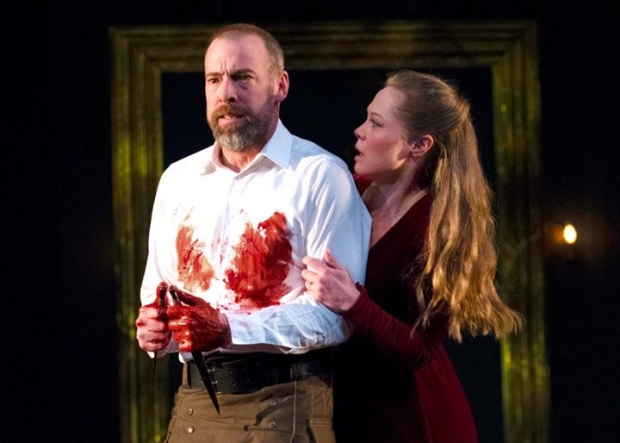Chills and Thrills Are on Full Display in Chicago Shakespeare's Macbeth
The company offers a swift and sure-footed production of the Scottish Play.

(© Michael Brosilow)
Chicago Shakespeare Theater's production of Macbeth, William Shakespeare's classic tragedy of ambition and madness, is first and foremost a horror story. Adapted and codirected by Aaron Posner and Teller (of famed magic duo Penn and Teller), this production lavishes attention on the grisly apparitions and prophecies of the text, creating an atmospheric, tense Macbeth.
Shakespeare's 1606 drama follows Macbeth, Thane of Glamis (Ian Merrill Peakes) on a bloody path toward the throne, spurred first by prophecy, then by his conniving wife (Chaon Cross). As they dispatch all who stand in the way of their plans, they slowly succumb to their conscience and shame.
In the title role, Peakes begins the play strong, both physically (when courtiers wax on his prowess in battle, you believe them) and vocally. As guilt and fear whittle away at the Scot, Peakes appears to waste away, suddenly swimming in his regal robes (designed by Mara Blumenfeld) like a child in his father's clothes. As Lady Macbeth, Cross vibrates with energy, a woman whose ambition is stifled by the restrictions of her gender. Posner and Teller's staging highlights the Macbeths' implicit past fertility issues, using the trauma of failed pregnancies and lost children to propel the Lady as she claws her way to the top.
The Weird Sisters (McKinley Carter, Theo Germaine, and Emily Ann Nichelson) share a sinister omnipresence as they sing and conjure dire prophecy as well as some impressive visual magic from within their bubbling cauldron. When Macbeth focuses away from the supernatural and onto political machinations, though, the magic fades away. As the good King Duncan, Christopher Donahue is affably sympathetic, but the human interest of the court dies with him. When the valiant Malcolm (Adam Wesley Brown) attempts to press his claim on Scotland, the scenes drag on. It's no fault of the performers: Brown is as fine a Malcolm as one could hope for, and Timothy D. Stickney's Macduff is appropriately noble and grave. Perhaps it's because the dire fates of the Macbeths are apparent from the very beginning, but the fate of Scotland's throne lacks urgency.
The play moves at a thrilling breakneck pace, with the exception of one overlong comedic interlude with the Porter (Matthew Floyd Miller) that stops Act 1 in its tracks. Percussive original music by Andre Pluess drives the pace of Posner and Teller's adaptation, along with Pluess's uncanny sound design. The grim highland mood is reinforced by Thom Weaver's lighting. Dan Conway's deceptively bare set is actually an intricate canvas for the magic design by Johnny Thompson. Unlike Posner and Teller's previous collaborative adaptation of The Tempest, where magic was a showy central element, the magic design in Macbeth is used sparsely but effectively. The real showcase in this production is the sense of terror it invokes.
Combining supernatural ghost stories with mind-bending suspense, adding in a healthy amount of body horror, and finishing with the grisly gore of a slasher film, this Macbeth is dark and powerful.







![0928 Cleveland MatteoLane 2024 1200x1200[98] copy](https://www.theatermania.com/wp-content/uploads/sites/4/2024/10/0928_Cleveland_MatteoLane_2024_1200x120098-copy.jpeg?w=300)



